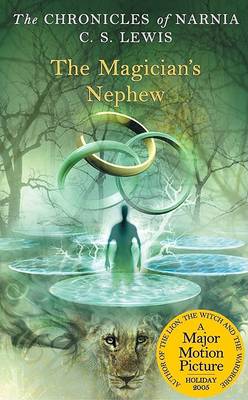Reviewed by Briana @ Pages Unbound on
Re-reading has slowly changed my opinion. In the first place, I have grown to believe that watching a world come into being is interesting after all. There is the obvious enjoyment that readers learn a few fun facts from this book, such as where the lamppost and the White Witch in The Lion, the Witch, and the Wardrobe originate, but there is also a more subtle pleasure to be had in watching Aslan bring Narnia to life. The connections between Aslan and God are fairly obvious here; he is the Creator, he is both terrifying and wonderful, and he knows everything about you. Watching Lewis’s imagining of how a Creator might operate is fascinating. The Magician’s Nephew, then, is a bit more about the experience of art and creation than about an exciting plot.
Nonetheless, the book does have entertaining moments. Digory’s Uncle Andrew is a schemer with no backbone to support his plans, and it gets him into some hilarious situations when he must interact with people of stronger personalities. Likewise, the Talking Animals Aslan creates get into lots of scrapes while exploring the new world around them. And, yes, there is the rampaging evil Sorceress. While these moments have never struck me as comprising the bulk of the book, they do add lots of life and fun.
Finally, this is Narnia and it is Christian allegory, so of course there are moral lessons. However, Lewis manages to incorporate them into the plot; it is Digory learning the lessons, and then the reader tangentially, so it never sounds preachy. As a child, I never felt Lewis was talking down to me or purposely trying to instruct me from his vantage as a wise adult, and I never get that sense from re-reading.
The Magician’s Nephew is a quieter book than some of the other Chronicles, but it is imaginative and ultimately charming. It also helps complete the circle of Narnia’s existence by presenting its origin, and I think portraying a world from start to finish is a beautiful concept for a series.
Reading updates
- Started reading
- 16 January, 2013: Finished reading
- 5 February, 2013: Reviewed
- Started reading
- Finished reading
- 5 February, 2013: Reviewed
